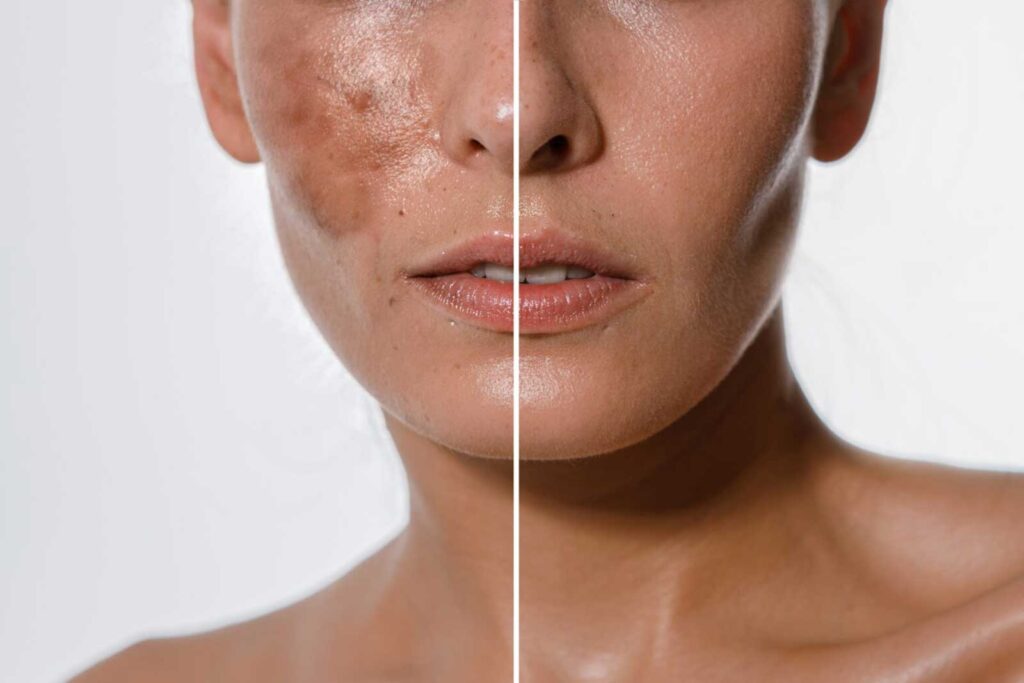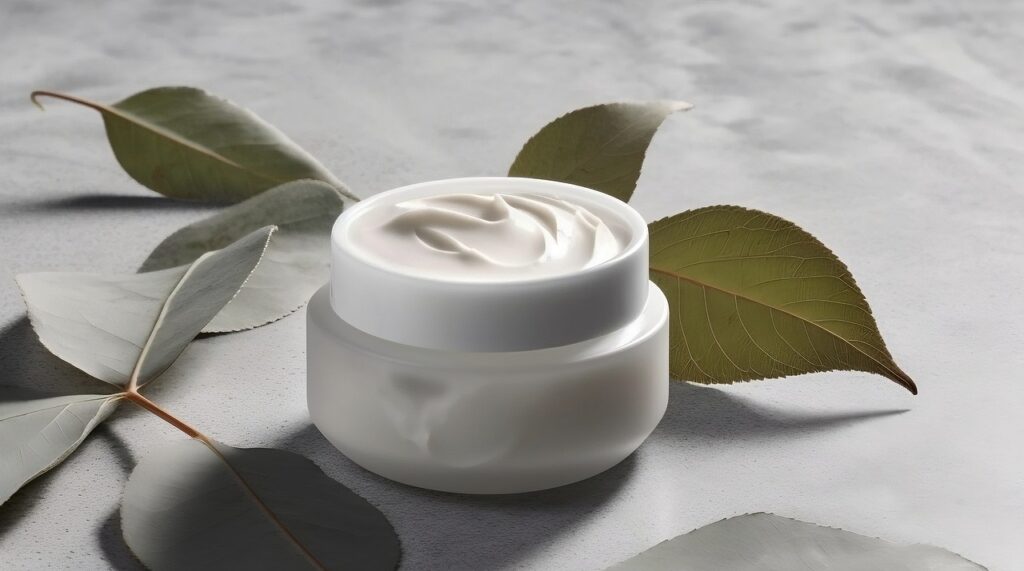Pigmentation issues like melasma can impact skin appearance and confidence, leading individuals to seek effective solutions. At My Skin Pharmacy, we often receive queries from visitors about pigmentation concerns. In this comprehensive blog post, we’ll address common questions on pigmentation and melasma, delve into current compounded skincare therapies and explore new advances in treatments for pigmentation.
What Causes Skin Pigmentation?
Skin pigmentation can result from various factors like sun exposure, hormonal changes, genetics, and skin injuries. Melasma, a specific form of pigmentation, is often triggered by hormonal fluctuations and UV exposure.
How Can I Prevent and Manage Melasma?
Prevention involves sun protection and hormone management. Treatment options include topical creams, chemical peels, and laser therapy. Consulting a dermatologist for a personalised plan is crucial.
Are Over-the-Counter Products Effective for Melasma?
Certain products like sunscreen, antioxidant serums, and gentle exfoliants can contribute to managing melasma. However, severe cases may require prescription treatments for best results.
Can Melasma Fade Completely with Treatment?
While melasma can improve with treatment, complete resolution may be challenging, especially in resistant cases. Consistent use of prescribed therapies and sun protection is key for long-term management.
Are There Natural Remedies for Pigmentation?
Natural ingredients like licorice extract, green tea, and vitamin C can help manage pigmentation to some extent. However, professional treatments may be more effective for significant pigmentation issues.
What are the Commonly Compounded Active Ingredients for Pigmentation?
The following actives are commonly compounded in varying strengths alone or in combination. Tretinoin and Hydroquinone are applied at night-time as they are both photo sensitive actives, whilst Arbutin, Kojic Acid, Vitamin B (Niacinamide), Vitamin C and Azelaic acid are used during the day. It is pivotal that a physical sunscreen (preferred) or an SPF 30-50 sunscreen is used during the day whilst being treated with pigmentation creams. Sunscreens which contain iron oxides will provide added protection against blue light and photo aging.
- Hydroquinone: Inhibits melanin production through tyrosinase, the enzyme responsible for melanin production. By blocking tyrosinase in the pigment pathway this leads to lightening of dark spots.
- Tretinoin: Stimulates cell turnover, aiding in the removal of pigmented skin cells and promoting even skin tone.
- Arbutin: Acts as a tyrosinase inhibitor, limiting melanin production and supporting skin lightening.
- Kojic Acid: Another tyrosinase inhibitor, which disrupts the production of melanin ultimately helping to fade pigmentation and brighten the complexion.
- Vitamin C: Provides antioxidant protection, neutralising free radicals and interferes with pigment production for a more uniform skin tone.
- Azelaic Acid: Known for its anti-inflammatory (by normalising the growth of skin cells) and antioxidant properties, azelaic acid can target pigmentation and improve overall skin health.
- Niacinamide: Helps regulate the transfer of melanin to skin cells, reduces inflammation, regulates melanin production, and enhances the skin’s barrier function, leading to improved skin tone and texture.
How will Customised Prescription Night Creams Treat my Pigmentation?
Customised prescription creams can play a crucial role in addressing pigmentation issues such as Post Inflammatory Hyperpigmentation (PIH) and melasma. Here’s how tailored skincare regimens can effectively target these concerns:
Targeted Ingredients
Customised skincare allows for the inclusion of ingredients known to address pigmentation concerns effectively. For PIH and melasma, ingredients like hydroquinone, retinoids (e.g., tretinoin), kojic acid, azelaic acid, arbutin, vitamin C, niacinamide and licorice extract can be combined in different concentrations to target pigmentation at multiple levels.
Personalised Formulation
Skin can react differently to various ingredients, and customised skincare ensures that formulations are tailored to your skin type, sensitivity, and specific concerns. This approach minimises the risk of irritation or adverse reactions, which can be crucial when dealing with pigmentation issues like PIH and melasma.
Gradual Introduction of Active Ingredients
Customised skincare allows for the gradual introduction of active ingredients to the skin, reducing the risk of irritation or inflammation. This is particularly important when dealing with pigmentation concerns, as aggressive treatments can exacerbate the issue or lead to further hyperpigmentation.
Consistent and Complementary Regimens
A personalised skincare regimen can be created to ensure consistency in treatment. Combining products that work synergistically to target pigmentation can enhance the overall efficacy of the regimen. For example, combining a melanin-inhibiting agent like hydroquinone with a collagen-boosting ingredient like vitamin C can help address both pigmentation and skin texture concerns.
Maintenance and Prevention
Customised skincare can also include products for post-treatment maintenance and prevention of future pigmentation issues. Sunscreen becomes a critical component in preventing pigmentation from worsening or recurring, especially for conditions like melasma that are exacerbated by UV exposure.
Professional Guidance and Monitoring
Working with a compounding pharmacist or skincare professional allows for regular monitoring of your skin’s progress and adjustments to the regimen as needed. This support ensures that your skincare routine remains effective in addressing PIH and melasma while adapting to any skin changes over time.
What are Medical Peels and How do they Work?
Along with customised prescription night creams, maintaining the integrity of your skin with the right medical peel will help keep your pigmentation at bay. Choosing the right type and strength of peel is paramount and therefore talking to a skin expert is highly recommended. Here’s how medical peels work and the ingredients and percentages commonly used in compounded formulations:
How Chemical Peels Work
Medical peels involve the application of a chemical solution to the skin, which causes the top layers to peel off, revealing smoother, brighter skin underneath. The depth of the peel and the concentration of the ingredients determine the extent of exfoliation and the desired results. Medical peels work by:
- Exfoliation: The peeling solution removes dead skin cells, promoting cell turnover and revealing fresh, evenly pigmented skin.
- Stimulation: Chemical peels can stimulate collagen production, improving skin texture and firmness.
- Pigmentation Reduction: Ingredients in the peel can target melanin production, helping to fade dark spots and even out skin tone.
Ingredients and Percentages in Compound Chemical Peels
| Benefit | Concentration Range | |
| Glycolic Acid (AHA) | Exfoliates the skin, improves texture, and helps reduce hyperpigmentation | 20% to 70% |
| Salicylic Acid (BHA) | Penetrates pores, reduces inflammation, and can help with acne-related pigmentation | 9% to 30% |
| Lactic Acid (AHA) | Exfoliates, hydrates the skin, and improves pigmentation and texture | 30% to 70% |
| TCA (Trichloroacetic Acid) | Penetrates deeper into the skin, targets pigmentation, and stimulates collagen production | 10% to 35% |
| Kojic Acid | Acts as a skin-lightening agent, helping to fade pigmentation and improve skin tone | 1% to 4% |
Combination Peels:
In compounded chemical peels, multiple ingredients can be combined to create a customised formulation that targets specific skin concerns. For example:
- Combination AHA/BHA Peels : Containing glycolic acid and salicylic acid, this type of peel can exfoliate the skin, unclog pores, and improve pigmentation issues.
- Triple Acid Peels: Combining glycolic, lactic, and salicylic acids, these peels offer a comprehensive exfoliation and pigmentation treatment.
By offering tailored chemical peel formulations, compounded skincare can provide a targeted approach to addressing pigmentation issues like PIH and melasma. The combination of exfoliating acids and skin-lightening agents in carefully calibrated concentrations can help to fade dark spots, improve skin texture, and enhance overall skin tone.
New Advances in Compounded Treatments for Pigmentation
Recent advancements in compounded treatments have led to innovative formulations that target pigmentation more effectively.
- Combined Formulations: Compounded treatments that combine multiple active ingredients tailored to individual needs for enhanced efficacy and convenience.
- Microencapsulation Technology: Advanced delivery systems that protect active ingredients, ensuring better penetration and prolonged action.
- Transdermal Patches: Innovative patches containing customised compounds for targeted and prolonged treatment of pigmentation.
- Peptide Therapy: Compounded treatments utilising peptides to address pigmentation concerns by targeting specific skin functions and promoting skin rejuvenation.
- Botanical Extracts: Formulations incorporating potent botanical extracts with skin-lightening properties for a more natural approach to pigmentation treatment.
By combining multiple active ingredients and utilizing advanced delivery systems like liposomal technology, these treatments can penetrate deep into the skin for optimal results. Lightening pigmentation spots and achieving a more even skin tone has never been easier with these cutting-edge solutions.
Laser Options for Treating Pigmentation and Melasma:
Laser treatments target specific pigmented areas of the skin, breaking down excess melanin and promoting skin rejuvenation. These procedures are safe, effective, and can provide visible results in improving skin tone and texture.
Choosing My Skin Pharmacy for your Pigmentation Journey
At My Skin Compounding Pharmacy, we understand the impact pigmentation and melasma can have on your skin and confidence. Our team of experienced compounding pharmacists and skincare experts are dedicated to providing tailored solutions to address your specific needs through prescription night creams or medical peels. In addition to compounded therapies, My Skin Compounding Pharmacy is affiliated with Top dermatology clinics such as Cutis Clinic Taringa which offer laser treatment options as adjunct treatment for your pigmentation.
By offering customised compounded therapies and personalised advice, we aim to help you achieve a brighter, more radiant complexion. Contact us today to learn more about our services and how we can assist you in achieving your skincare goals.

Lane Khin, the compounding pharmacist of My Skin Pharmacy, brings a wealth of knowledge from the worlds of pharmacy and dermatology to the table. With degrees in Pharmacy and Applied Science from QUT, Lane combines a deep understanding of compounding and skincare with a friendly, accessible approach. Through My Skin Magazine, Lane shares her expertise, offering readers practical advice and insights into personalised skincare solutions. Lane has a real passion for helping others achieve their best skin.


